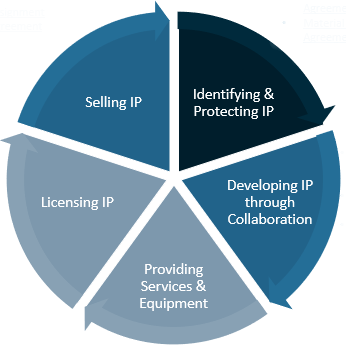If you are unclear as to which agreement is applicable for your particular circumstance, the following section of the guidance will help you navigate the IP Framework.
Early discussions with your potential partner are the key to reaching a fair agreement, as agreements can take three to six months or more to negotiate and sign, particularly for research and licence agreements. This guidance will help you understand the key considerations each party will have and help to structure those discussions.
On this page:
If you are unclear as to which agreement is applicable for your particular circumstance, the following section of the guidance will help you navigate the IP Framework.
Early discussions with your potential partner are the key to reaching a fair agreement, as agreements can take three to six months or more to negotiate and sign, particularly for research and licence agreements. This guidance will help you understand the key considerations each party will have and help to structure those discussions.
3.1 - Common Scenarios where you would use the IP Framework
Whilst not exhaustive, common scenarios where the IP Framework can guide you include:
- A university and a company want to do some investigative research, with both parties contributing to the plan or the work
- Commercialisation Pathway: Developing IP through Collaboration
- Agreement template(s):
- Mutual Confidentiality Agreement – if confidential information needs to be disclosed as part of the initial discussions to plan the proposed project
- Accelerated Research Agreement or Standard Research Agreement – the guidance will help you decide. A Multi-party Collaboration Agreement is provided for when there are more than two parties
- A company wishes to use IP from a university to develop into a new product or service
- Commercialisation Pathways: Licensing IP, Selling IP
- Agreement template(s):
- Mutual Confidentiality Agreement – if confidential information needs to be disclosed as part of the negotiations
- Accelerated Non-Exclusive, Standard Non-Exclusive, or Standard Exclusive Licence Agreement, or Assignment Agreement – the guidance will help you decide
- A company approaches a university to access expertise to help the company test a product and provide a technical report, with the work specified by the company
- Commercialisation Pathway: Providing Services & Equipment
- Agreement template(s):
- Mutual Confidentiality Agreement – if confidential information needs to be disclosed as part of the initial discussions to plan the work and agree a work schedule and price before entering a formal services agreement
- Technical (Consulting) Services Agreement – to cover each party’s duties and rights associated with the delivery of the services
3.2 - Commercialisation Pathway
A good starting point is to consider where you are on the commercialisation pathway and what you are trying to achieve with your partner.
The agreements provided under the HERC IP Framework are segmented to five key activities that encompass the majority of university / industry partner interactions:
- Identifying & Protecting IP – agreements to help you protect your confidential information in discussions with another party or to provide or access proprietary materials for your research
- Developing IP through Collaboration – agreements for research projects where the parties are working together to develop new technologies or solve research problems
- Providing Services & Equipment – agreements for companies that want to commission a technical (consulting) service or access equipment at a university
- Licensing IP – agreements that allow an industry partner to use IP which is owned by a university for internal use or commercialisation by the partner
- Selling IP – an agreement to purchase IP from a university for internal or commercial use.
Selling IP
Licensing IP
- Accelerated Licence Agreement (including low risk Commercialisation)
- Licence Agreement (Non-exclusive Commercialisation)
- Licence Agreement (Exclusive Commercialisation)
Providing Services & Equipment

Identifying & Protecting IP
Developing IP through Collaboration
The journey of commercialising IP will be unique to each opportunity. The steps illustrated above do not necessarily follow in the order depicted. Opportunities can develop along their own Pathway.
Click on the links for further guidance and advice on understanding each commercialisation pathway and the key considerations when negotiating an agreement under the respective pathway with a partner.
The parties may wish to vary an agreement once a project is underway, for example, to change a research plan or extend a collaboration. A Variation Agreement is provided within the Framework for this purpose, including one specific for the Multi-party Collaboration Agreement.
3.3 - Sources of further help
Still not sure where to start?
The Australian IP Toolkit for Collaboration provides additional toolkits for companies and universities planning collaborations that you may also find useful as a starting point.
